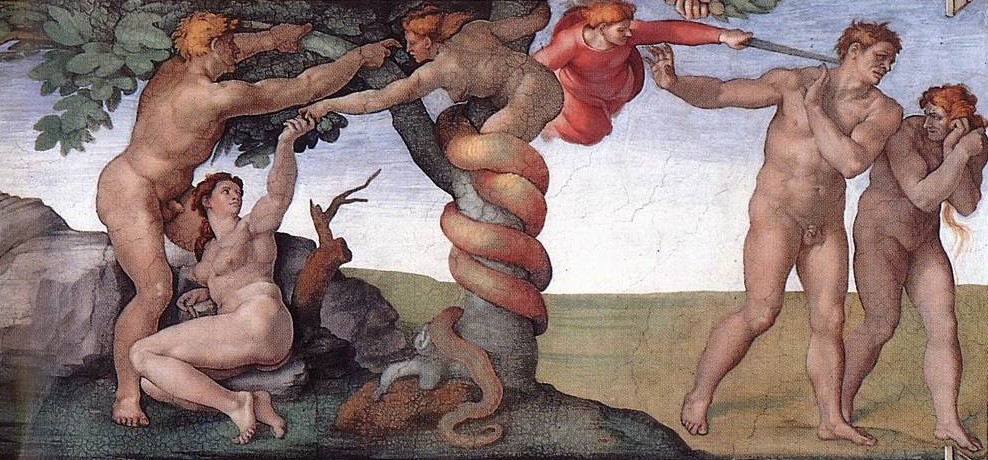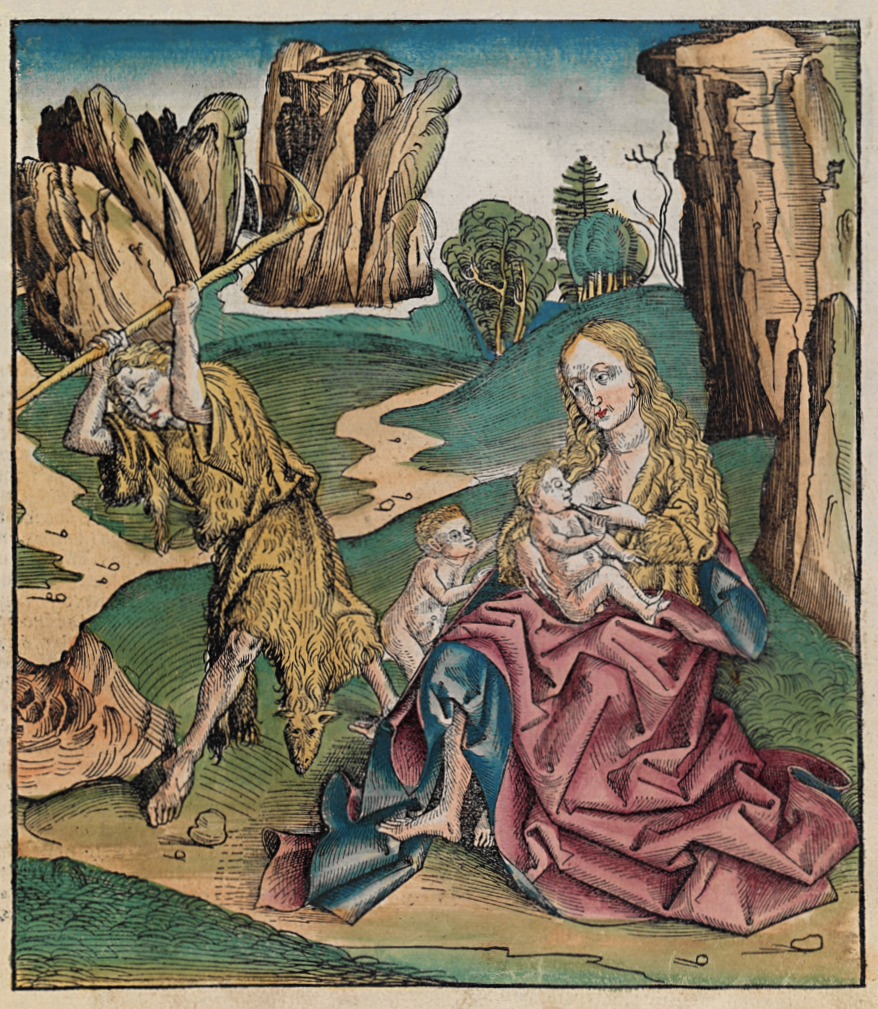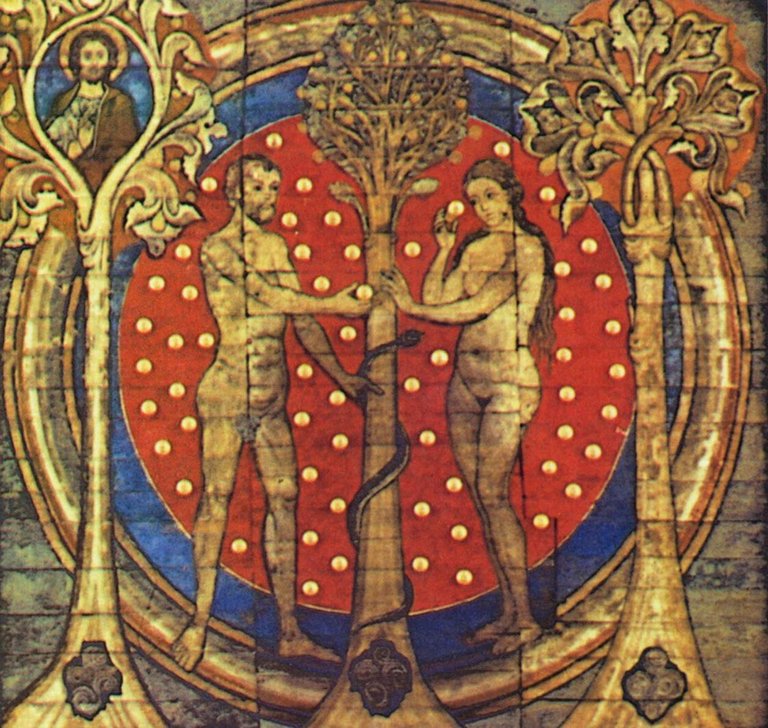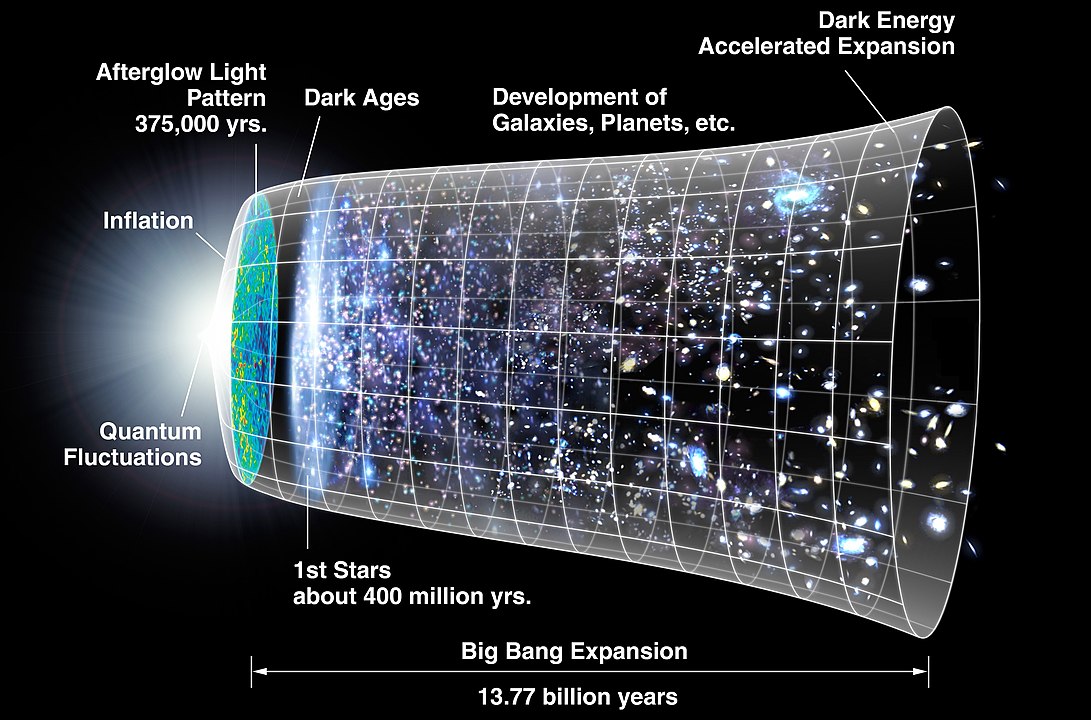The story of Adam and Eve contains several paradoxes.

If Adam and Eve, as the first humans created by God, knew nothing but paradise, it must be assumed that they were simple natural creatures, similar to animals.
As the Story of Genesis itself did not yet contain any state of sinfulness -
the Ten Commandments did not even exist at that time in the story - Adam and Eve could not have been sinners. The paradox is that they knew nothing of sins but were punished for sins as "theirs".
For if, as the first innocent human beings, they lived in ignorance of human weaknesses and strengths, the warning not to eat the fruit of the tree must have seemed to them neither alarming nor tempting.
The story is therefore puzzling.
,_Herzog_Anton_Ulrich-Museum.jpg)
Now, let's talk about the puzzle.
Where the first man, due to his innocent nature, is neither particularly fallible nor particularly infallible, God's statement "not to eat from the tree" basically comes across as a completely nonsensical statement.
Perhaps a comparison will help. When a father tells his three-year-old son not to use the bread-slicing machine in the kitchen, he is drawing the child's attention to the machine. The warning that the child could hurt itself is not understood by the child if it does not know what a bread slicer is. But by pointing to it, the father focuses the child's attention on this particular object.
Addition to the story
The child may remain indifferent to this, so it depends on how the story is further told. Another character is needed to disrupt the child's possible indifference. The snake enters the scene - and it, just like God himself, once again draws attention to the fruit of the tree and promises the opposite of danger, i.e. "recognition". Such a concentrated focus and the contradiction contained through having both statements on one and the same object arouses the curiosity of the innocent and inexperienced child. If not of its own accord, it will now take the fruit and taste it at the behest of both statements.
But if we now consider the entire creation mythology, God created all earthly creatures, including the serpent. But the serpent appears more human than animal, because it can speak. This raises the major question that if God is also the creator of the serpent, how it can be that it is able to speak and not only that, but also to contradict His will. This in turn can be followed by an interpretation and reading that concerns the question of God's omnipotence.

One interpretation can be that this omnipotence also expresses a weakness of power at the same time. For he who is as great and powerful as God, and who gives things their vitality, cannot nevertheless be so powerful as to foresee the very small details of their peculiarities and behaviour. If God has given things their vitality, it is nevertheless beyond his control how they develop in particular, because such is the nature of the living. It behaves unexpectedly and unpredictably just as it behaves predictably.
Creation therefore always contains an element of uncertainty and surprise.
Just as parents cannot predetermine the entire path of their children's lives, God cannot completely predetermine the path of humanity. If he could, both his own existence and ministry would be meaning less and creation would not even be necessary if everything could be precisely determined and controlled anyway.
There is therefore always a tension between fate and predictability, and this tension contains everything that makes creation - life - so fascinating.
The fascination lies in the adventure.
Just as the cosmos is not a place that is merely the movement of cold celestial bodies, but contains something else, something far more mysterious, in addition to the physical events, being human and the human conscience is similarly a mystery that offers not total certainty, but a not total foreboding. Hunches have been shown to be significant whenever a human being grapples with questions of conscience about his or her existence. If he had total certainty, he would not be a human being.
The often expressed truncated version of certainty in uncertainty is found in Christians saying that "the Bible speaks the truth."
In fact, it can be said that the contradictions in Genesis express just that, that finding the truth is not easy, but puzzling, and therefore this statement is true and wants to be understood as such by Christians.
Minds that do not even deal with such theologically interesting questions demand a "proof of this truth" from a Christian.
They could just as well want to demand that the very first Bible ever published in book form should be brought forward. And if you did, of course they would not believe it.
But a Christian would not believe it either, because his concern is not to show the original text, but to respect the interpretations of the religious and handed-down scriptures. "Respect it" means to contemplate about the contents of biblical stories and to find orientation in them through this intimate act of contemplation (asking the self about important matters of conscience). Who wills to find faith, finds ways in favor of it, but who wills no faith, finds arguments against it.
"Will" is the crucial element.

To quote G. K. Chesterton:
"... the rational human faith must armor itself with prejudice in an age of prejudices, just as it armoured itself with logic in an age of logic. But the difference between the two mental methods is marked and unmistakable. The essential of the difference is this: that prejudices are divergent, whereas creeds are always in collision. Believers bump into each other; whereas bigots keep out of each other’s way. A creed is a collective thing, and even its sins are sociable. A prejudice is a private thing, and even its tolerance is misanthropic."
If one has the impression of the other that he is a bigot ("I do not talk to you") the bump into each other does not take place (or better: it maybe a bump but after it has happened the involved move away from each other without interacting). If one owes a creed and the other doesn't, what is the former supposed to say?
If a non Christian tells a Christian that what he believes in is "mere fantasy"
he not only shows that he does not want to talk but that he - as the alleged superior of the two - sees no need in building his own case. He offers no case at all. But he instead demands "evidence" of something which very obviously cannot offer such clear proof. He ends all theological debate even before he enters it.

This would be the same if a Christian demands proof from the non Christian (let's call him a materialist) of the "first Big Bang" - a widely accepted theory in the scientific realm. Now, what other is this theory than a mystery? Terence McKenna called it the
"one free miracle of science".
But both are bigots if they are not willing to talk to one another (accept the challenge).
In the comment section of this channel: You as a commenter can ask yourself if you are just throwing around superficialities or if there is genuine interest in what was offered in the video and through the speakers. Go ahead and challenge the weak arguments and formulations but stopp telling them that they dwell in fantasies.
End of comment. I wrote this text above in response to a commenter on this YT video - with slight alterations. I'd say this publication works without you knowing the original words of the commenter. But in case you are interested, I gave you the link.
I want to ad:
Man loves riddles.
He likes to spend time pondering them, wanting to solve them.
Once a puzzle is solved, however, it loses all fascination.
Who pretends that the riddle of existence has been solved obviously no longer seems fascinated by life.
Children can do nothing with riddles for adults,
but to pretend that the Bible verses, their various millennia-old manifold interpretations, the commentaries and sub-commentaries as well as the own writings of countless theologians are not puzzling but "simple" because someone imagines in his hitherto uninvolved mind only a book of Proverbs - and thus feels that very simplicity which he blames on others - shows that he is not interested at all.
All right. But if I have no interest in something, then the recommendation would be to remain silent instead of ridiculing something that was and is of such great importance to humanity.
Since there is a difference between laughing at the punch line of a joke
and talking about life as a (sad) joke because one has been greeted as a cynic in the salon, the cynic is dependent on (fatalistic) approval from his fellow cynics - what a depressing effort - while the faithful non frustrated believer is ready to laugh at a new joke and keep telling or let it coming at him.
The mistake that adults, that is, people who have gone through many years of life, make is that they believe a child to have certain sensations and explanations that correspond to that of an adult. The adult, in this sense, is like a god who, because of his potency and potential, can hardly maintain a conception of the innocence and ignorance of a child.
He is only able to speak about himself as a child in retrospect.
And he often imputes an adult mindset to his childish experiences and memories. So speaking as a child in retrospective is trying to recall ones memory as accurate. But most of the time the adult's present mind interferes so much that it overpowers the former mind as a kid and all what you have left of your memories are not exact words but lack of words. You then fill them in.
Just as speechless as parents often find themselves towards their young children,
one can interpret the role of God. He is, because he is thought of as omniscient and omnipotent, nevertheless a God surprised by his children's idiosyncrasies. If this were not so, the children of men would know every secret, they would already be the accomplished beings who see through their own existence. And thus they would have completed God's creation.
Those who do not like or are not used to the personification of God (and don't see it as art/artistic expression) may prefer to translate it for themselves and regard the spark of conscience as an inspiration from whatever source.
For my part, I have found that accepting religious language and calling it a "divine spark" (of conscience) makes it easier for me. For there is one thing I do consider bottomless presumption: to think that any wisdom grew on my own dung. I would therefore like to express my appreciation to those whom we commonly recognise as "giants on whose shoulders we stand".
Since I am a Christian and was raised a Christian, I shall no longer hesitate to say so.
Picture Sources:
Von Michelangelo - www.heiligenlexikon.de/Fotos/Eva2.jpgÜbertragen aus de.wikipedia nach Commons durch Roberta F. mithilfe des CommonsHelper., 9. September 2007 (original upload date), Original uploader was Nitramtrebla at de.wikipedia, Gemeinfrei, https://commons.wikimedia.org/w/index.php?curid=7556462
Von Atelier/Werkstatt von Lucas Cranach der Ältere - Autor/-in unbekannt, Gemeinfrei, https://commons.wikimedia.org/w/index.php?curid=25632622
Von Ji-Elle - Eigenes Werk, CC BY-SA 3.0, https://commons.wikimedia.org/w/index.php?curid=11645695
Von Hartmann Schedel - Eigener Scanlanguage: Latin, Gemeinfrei, https://commons.wikimedia.org/w/index.php?curid=899087
Von Niedersächsischer Meister - The Yorck Project (2002) 10.000 Meisterwerke der Malerei (DVD-ROM), distributed by DIRECTMEDIA Publishing GmbH. ISBN: 3936122202., Gemeinfrei, https://commons.wikimedia.org/w/index.php?curid=156008
By NASA/WMAP Science Team - Original version: NASA; modified by Cherkash, Public Domain, https://commons.wikimedia.org/w/index.php?curid=11885244
Some text sources in addition:
https://www.school-for-champions.com/religion/resources.htm#Existence_God
Link Chesterton:

